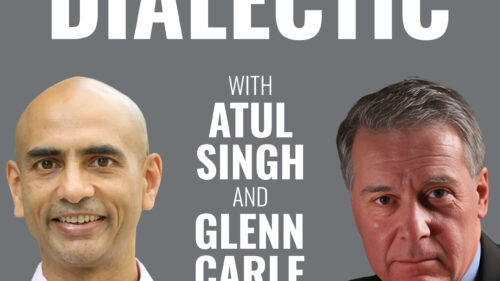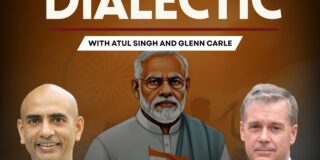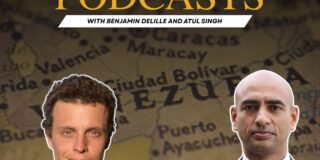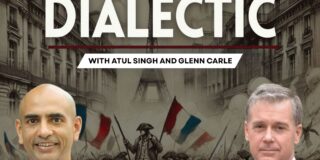Glenn Carle: Good afternoon. My name is Glenn Carle, and welcome to The Dialectic with the Rajput and the WASP. I am, I think you can tell by my accent, the WASP — originally an intelligence officer in the CIA. And my partner in oracle reading is Atul Singh, who is the founder, CEO and general pooh-bah of Fair Observer, a web-based magazine that brings you objective and non-regional focused truth about the issues confronting us everywhere today. Hello, Atul.
Atul Singh: Thank you, Glenn, and great to be back. Last time, we discussed Donald Trump and Harvard. And now we are moving to my home turf. (Laughs)
Glenn Carle: And I’m happy to pass this one, since if anything is complicated or intractable at the least, this subject seems to be. We’ll talk about today, broadly speaking, the India–Pakistan conflict, which is age-old, but specifically using as a starting point the April 22 attack by actually still-unknown, I believe — but you’ll tell us — terrorists in Kashmir.
These were Muslim-inspired terrorists, clearly, who targeted Hindu men, and killed 26 people. In response, on May 1, India struck nine sites in Kashmir and Pakistan itself, which it characterized — “it” being India — as military or terrorist sites. And the authorities in India went out of their way to underscore that they were not striking Pakistani army sites, but only those supporting terrorist training or civilian sites. Pakistan, of course, was outraged, and a week later — yesterday, in fact, on May 7 — itself responded to the response, attacking a number of sites in India, and that’s where we largely stand.
Atul Singh: Actually, I think they responded the same day, Glenn.
Glenn Carle: Aha. Well, with artillery shells and so on. I don’t think they launched a major strike. I think there was a bit of fire exchanged all along the Line of Control. And as I understood, along the entire Line of Control, which, that’d be a huge number of exchanges. But yesterday, they responded, I guess in their formal sense, by launching, I think, drone attacks. But the details, as important as they are — and you can fill us in more fully — frankly, I think are secondary to the classic questions, which no one has ever really been able to answer or solve at least, which is: What happened? Okay, who’s done this and why? And then we can go from there.
Roots of the India–Pakistan conflict
Atul Singh: So what happened was clearly a terrorist strike — clearly an Islamist terrorist strike. Indian authorities convinced that these are troops — I won’t get into names, we could, they are unimportant. These were groups trained in Pakistan. Perhaps they were Pakistani nationals, too. The hand of Inter-Services Intelligence and SSD — the Special Services Group, if I’m getting it correct, their commando force — seems to be there. It’s deep into Indian territory. And this is part of a pattern, because — as we discussed in one of our earlier discussions in a different format, on a different platform, you can find it on YouTube — we discussed how this has been part of a pattern in which Pakistan has escalated strikes on Indian security forces, particularly in Poonch and Rajouri, which are the two border districts along the Line of Control in Jammu. And they’ve also been practicing ethnic cleansing there.
The long game that Pakistan is playing is converting the population of Jammu and Kashmir to exclusively Muslim population. They’ve achieved this in Kashmir. They have managed to conduct a pogrom of Kashmiri Pandits in 1990, and now they are trying the same thing in Jammu. But in Jammu, they were targeting mainly security personnel, and that did not make the news. And in Belgaum — or rather, a few kilometers away from Pahalgam in a valley — they targeted tourists, because Indians were saying tourism has replaced terrorism, and Pakistan wanted to bring Kashmir back.
Pakistan, of course, has reasons for tensions. The Pakistani army is extremely unpopular right now. The most — yes, you are trying to say something.
Glenn Carle: Yeah. Let me take a step back for those of us who are more simple-minded, or at least further away from the problem. So what initially is in dispute? So, as everyone will know, in 1947, the British finally left the subcontinent, and India and Pakistan became two separate independent states. Pakistan, overwhelmingly Muslim; India, overwhelmingly Hindu.
Atul Singh: Well, let’s caveat that a bit. Pakistan basically completed the ethnic cleansing of all its minorities — Hindu and Sikh — and that included Pakistan, included then-East Pakistan, which is modern-day Bangladesh. India still today has more Muslims than Pakistan, so India never quite had the same ethnic cleansing of Pakistan. Let’s be very clear. India tried to be a socialist and secular republic.
Glenn Carle: A multi-ethnic republic.
Atul Singh: A multi-ethnic, socialist and secular republic. Yeah, multi-religious, multi-ethnic, multicultural. The great slogan was, “Unity in Diversity.” Anekta Mein Ekta. Jawaharlal Nehru, the first Indian Prime Minister, put in a very different vision of India to Muhammad Ali Jinnah, who was the founder of Pakistan.
Glenn Carle: And Pakistan’s existence, definition of self, really, is as an Islamic state. But more to the point for our discussion today is another unresolved point in the creation of Pakistan, India and independence from Great Britain, and that is the status of the two states, or royal princedoms, of Jammu and Kashmir.
Atul Singh: That was one. That was one. They’re two different regions in one princely state.
Glenn Carle: Right, right.
Atul Singh: And back in the day, that included Ladakh.
Glenn Carle: Which refused to become part of India initially, or Pakistan. We’ll skip the details of 1947–48. The prince agreed, under some duress, to become part of India. Pakistan refused to accept that and essentially invaded the western part.
Atul Singh: Hold fire, hold fire. So Glenn, the history is that the prince imagined to run an Asian Switzerland, and he held out to be independent. He held out for independence. But once the Pakistani regulars — especially modern-day Pashtuns, or they were then Pashtuns, too — when the Pakistanis used these Pashtuns to invade Kashmir, this triggered alarm. And then he packed off someone — or rather, Sardar Patel packed off someone. He was India’s first home minister, and he signed the instrument of accession. And then Kashmir became a part of India.
And in fact, it was thanks to Pashtun tribesmen raping Belgian nuns for three days and stopping, that we have Srinagar — because they, the Indian troops, flew into Srinagar airfield, and the Pashtuns were there right at the next hill. And so it was hill-to-hill fighting, and India began pushing them out. And then, of course, the UN intervened. And India at that time, in particular, being led by Jawaharlal Nehru, believed greatly in the United Nations and stopped the fighting and thought that the UN would decide. And as per the UN agreements, there was to be demilitarization and then a plebiscite. Of course, none of this transpired. The Line of Control is the de facto border.
Terrorism as state strategy
Atul Singh: Lest we forget, part of the state of Jammu and Kashmir was taken by China — especially Aksai Chin. They built a road through it. And that’s the Line of Actual Control. And Pakistanis ceded some of their territory to China: Shaksgam Valley. So there are three powers now contending over this territory. Each one of them claims a border unacceptable to the other. Actually, Pakistan and China may have borders acceptable to each other, but certainly not India vis-à-vis both Pakistan and China.
And the current tension playing out goes back right to 1947. Kashmir has been a bone of contention between these two countries. And at heart is the Pakistani belief that it is the homeland of the Muslims, and therefore all Muslim-majority areas in the Indian subcontinent should belong to Pakistan.
And at heart of the matter for India is that we are a secular, multi-ethnic, multicultural, multi-religious democracy. Therefore, Kashmir is a shining example of that integration that we have managed, despite being in a difficult neighborhood and despite starting from a low base. So both these countries are sentimental about this issue, emotional about this issue, because it ties in with their identity.
Glenn Carle: And to solve the issue, Pakistan and India have gone to war three times — but the costs of trying to resolve the issue—
Atul Singh: Arguably four times — 1999, Kargil, too.
Glenn Carle: —have always been greater than the rewards obtainable by conventional military. So what has happened?
Atul Singh: Don’t know! I mean, there is an argument to be made: In ‘48, Pakistan was then pretty much bankrupt. If the Indians had pushed on, they would have had all of Kashmir. But they didn’t.
Glenn Carle: But “if” is a small word with a large importance.
Atul Singh: That’s true. And in 1971, India did liberate Bangladesh, and militarily it was on the ascendant. It had thousands of prisoners of war, but as many people say, including, by the way, many Americans and many British diplomats, India won the war but lost the peace. Zulfikar Ali Bhutto out-negotiated Indira Gandhi. Indians have long had a fixation for tall, fair-skinned Pakistanis — the Indian elite, especially the socialist elite. And these Pakistani prisoners of war were fed very well, actually. They were given extra rations, which the Indians weren’t.
So there is an argument there. But the reality is the 1999 costs were really high. We lost some of the flower of our youth in that Kargil border. And today, it is impossible, perhaps, for any country to claim an inch of territory without a lot of loss of blood and treasure.
Glenn Carle: Well, whether a conventional military solution might have occurred, it hasn’t. And so you have Jammu and Kashmir divided — two-thirds of the territory controlled by India, and now an integral part of India since 2019, and one-third controlled by Pakistan. Pakistan’s response to this — and they do deny the following, but it is a fact — has been: “Well, we can’t solve the problem militarily, and we aren’t going to concede the issue. So we will use terrorist surrogates to destabilize India’s control, terrorize the population, and change” — as Atul Singh mentioned before — “the ethnic composition, religious composition, of the disputed territory.”
So they, through the ISI, which is Pakistan’s intelligence service—
Atul Singh: Inter-Services Intelligence.
Glenn Carle: They have, for decades, trained and then sent on missions various terrorist groups. Now I didn’t mention the two names before, and this isn’t supposed to be a terrorist brief, but I’ll mention the names. The two principal groups that seem to have been involved conducting terrorist operations in Kashmir, but elsewhere too, against Indians and against Americans are groups called Jaish-e-Mohammed and Lashkar-e-Taiba.
Now, they’re relevant primarily, I would argue, for two reasons. One, you can call them, broadly speaking, fundamentalist Islamists who have a militant view of how to live Islam, which is by the sword. It must be imposed, and anyone who does not accept it must be killed.
But they have been exploited by and fostered by the Pakistani intelligence service. It is believed that one of those two groups conducted the attack on April 22. We haven’t had definitive proof or evidence to that effect, but it is highly likely. Now, the Pakistanis always have denied that they have had anything to do with terrorism and that they oppose it. It’s true the Pakistanis have opposed terrorism when it interferes with their interests, when it is Muslim-inspired, as has happened since the beginning of Pakistan’s existence in the North-West Frontier Province and elsewhere.
But it is not true, and they are just being cynical and duplicitous, when they deny to me, or to the CIA, or to Indians, that they have anything to do with terrorism. The evidence is overwhelming and multiple that their intelligence service has fostered, trained and supports these groups. And they clearly did that in 2008 in the attack on the Taj Mahal Hotel in Mumbai—
Atul Singh: Where you’ve stayed.
Glenn Carle: Where I have stayed — and many other attacks. So that’s the tool they have been using, and what seems to have been the case.
Pakistan’s radicalization and the Article 370 debate
Now, how does a state respond to that? We saw what India has done in the last week, but it is a dilemma for a state that does not use terrorism, happily, to try to find a way to parry and stop the use of a terrorist organization. So take it from there.
Atul Singh: Yeah, Glenn, before I take it from there, let’s look at the history of terror as an instrument of state policy. To be fair to the Pakistanis, till 1971, they did not use as much terrorism. Yes, they used irregulars in ‘47. So, ‘71 was traumatic for Pakistan because they lost Bangladesh. And that was partly because of their own racism, their own intolerance, their own policy of ethnic cleansing and mass rape, and being undemocratic. It had become a military dictatorship. And the likes of Zulfikar Ali Bhutto had a big role there because he wanted to be Prime Minister, despite the fact he’d lost the majority.
So in any case, perhaps Pakistan and Bangladesh could never exist as one country. It was like the union between Egypt and Syria. It never quite succeeded, was a short-lived affair. Here, it wasn’t a short-lived affair. It continued from 1947 to 1971, so it continued 24 years. But once that happens, and once India develops a nuclear program and Zulfikar Ali Bhutto sets in train — he doesn’t, but at least he doesn’t oppose it — this radicalization of Pakistan as a Muslim nation, he declares the Ahmadis to be non-Muslims. Then he himself is hanged by General Zia-ul-Haq, who was your loyal Cold War ally. He certainly helped the US fight the Soviets.
Glenn Carle: Well, all the Pakistanis were.
Atul Singh: Yeah, all the Pakistanis then were. But at the same time, he diverted some money and he came up with Operation Tupac: Bleed India through a thousand cuts. Because he realized, okay, if we go for a head-on military conflict, we’ll probably lose. But India is diverse. India has, to use V. S. Naipaul’s words, “a million mutinies now,” and we can aid and abet some of them.
And initially, he encouraged terrorism in Punjab. Initially, the playbook was Punjab. And the Sikh insurgency erupted in the ‘80s. If you remember the ‘80s, the Indian Army stormed the Golden Temple because you had the likes of Jarnail Singh Bhindranwale ensconced there. Now, bit by bit, the Sikh insurgency died — much effort by the Indian state. And of course, the Sikhs are pretty well integrated in India. And Manmohan Singh was Prime Minister of India for ten years. A Sikh gentleman was Prime Minister of India. So the Sikhs realized they had a lot more to gain within India than outside it. And the only Sikhs who want independence are the Sikhs in Khalistan because they fled India at that time and carry the same ideas as of 40 years ago.
But starting in 1989, Pakistan got the chance to use the same playbook in Kashmir, and that has proved to be far more potent. Partly because in 1987, Rajiv Gandhi, the son of Indira Gandhi and the grandson of Jawaharlal Nehru, in his wisdom, decided that he would rig the election. Once he rigged the election in 1987 because there was fear that separatists would win, there was no going back. People lost faith in the democratic process. It erupted and the insurgency erupted.
We’ve had elections. We’ve had periods of relative peace. And since this government has been in power, there has been a little bit more peace, even though for the last few years there was violence in the Jammu region. But India, by clamping down, by having a lot of security forces, by encouraging tourism, by building infrastructure, by giving out massive subsidies, has managed to keep the peace.
But for Pakistan, they cannot counter India by offering economic sweetness. They are a much smaller economy. They’ve gone to the International Monetary Fund 17 times already. They’re a basket case. And therefore, they have to use terrorism, and they have been paranoid about the lack of strategic depth. That’s why they also encouraged the Taliban. And the Taliban is in power in Kabul. That’s another matter, that there is still fighting over the Durand Line. Pakistan accepts it; Afghanistan doesn’t.
Glenn Carle: That’s the border between Pakistan and Afghanistan.
Okay, so we mentioned the bare sketch of the details of what’s happened on April 22 of this year and since. We’ve noted that it is the latest terrorist incident concerning Kashmir of many. So why then is this being presented by many pundits and the media as somehow qualitatively different and seemingly more alarming, more dangerous, than previous episodes — one. And two, other than pride, what makes this issue seemingly existential for Pakistan and India?
Atul Singh: I think, objectively, perhaps it is not as terrible as 1990. In 1990, there was complete ethnic cleansing of Kashmiri Pandits from the Kashmir Valley. They were told basically to go, otherwise they’d be killed and their women would be raped — and they fled en masse. So is this bigger than that? No. There have been some other incidents you could argue that were far more alarming.
The reason why India perceives this as a big incident is simple. For the last few years, the Narendra Modi government has claimed that Kashmir is peaceful. They have claimed that they’ve replaced terrorism by tourism. They have sought to bring in investment from the Gulf into Kashmir. So the attack completely destroys their credibility on national security, because Kashmir is not peaceful. The tourists who went there, who were enjoying their time in the valley, were killed in cold blood. They were killed in an October 7-like attack, which was intended to strike terror, kill tourists and kill tourism — a very clear aim.
And this will now send, and already has sent, a chill of fear. How many people are going to go travel to Kashmir? I had American friends who were planning on going skiing this winter to Kashmir. I’m sure they are not planning their trips now. They are probably planning to go skiing elsewhere. So this will hit the Kashmir economy. And this is huge, because that was the play the Bharatiya Janata Party government led by Narendra Modi was making to make Kashmir an integral part of the economy.
Glenn Carle: One can argue that one terrorist attack in six years of a policy, on one side of the ledger, and on the other side of the ledger, an increase in millions — I think it was 26 million or so, I heard something like that — of tourists who have gone to the region since the change in policy. It would be unfortunate were one incident able to undo six years of seeming objective success.
Atul Singh: Yeah, I think that’s fair. That is absolutely true, and that’s unfortunate. But as you know, people are emotional creatures. People are prisoners of perception. So yes, although it has been one incident — but the fact that so many people were killed in cold blood, security forces took such a long time to arrive there — and this was clearly intended for anyone non-Muslim. Although one Muslim local pony operator did die trying to save the tourists.
This sends a chill down everyone’s spine. A Christian gentleman said, “Look, I’m Christian,” and they said, reportedly, “Take that for Palestine.” The poor chap, I mean, they probably didn’t read their Palestinian history. Hanan Ashrawi, the Palestinian spokeswoman for the PLO (Palestinian Liberation Organization) was Christian. So was Edward Said, another champion of Palestinian rights.
So what this has conveyed is that if you’re non-Muslim, you could be targeted, and no one really wants to die.
So how does the state react? That was the question you posed to me. And the answer is: with difficulty. Because what do you do with a problem like Pakistan? And you’ve had the same problem in the US. India has had the same problem for longer. You have a regime that has fundamentally failed its people. The secular elites of Pakistan have fled the country. They don’t even live in the country. They live in England, they live in Canada, they live in Dubai of late, and of course, they also live in the US.
So increasingly, the state is utterly corrupt, irredeemably corrupt. So it cannot provide schools, it cannot provide hospitals, it cannot provide roads, it cannot provide clean drinking water. It has a feudal society where the likes of Bilawal Bhutto, the current foreign minister, live in absolute splendor, whilst his serfs live in squalor. So this feudal society, wherein the elites run a parasitic, exploitative, extractive state, has a situation where the only people delivering services are the Muslim fundamentalists, quite often. The madrasas are where young children do get a free education. And unfortunately, there they are also fed the diet of “kill all the kafirs” — or the kuffars, if you want to use the Arabic version. “Kafir” is what is used in South Asia, where they are taught that—
Glenn Carle: Which means non-believers.
Atul Singh: Which means non-believers — where they are taught that one day Islam will return to its glory, and if they are willing to fight for jihad, then there’ll be rivers of milk and honey.
And so there is this extraordinary vortex going on in Pakistan, wherein the society is increasingly becoming more and more radicalized. The political class is completely discredited. The Pakistani army has locked up its most popular political leaders since Zulfikar Ali Bhutto. They’ve propped up old, corrupt dynasties. So the state has to somehow stay united using a bogeyman, and India is the bogeyman. And if you have to take on India, then you have to use terror, because you can’t fight India militarily.
Glenn Carle: Now, could not one say that part of the reason this incident seems to have more resonance, to be more dangerous and to have caused more alarm, is that it apparently — whether in fact or not, I don’t know, but perception is reality in many instances — has given the lie, as it were, to Narendra Modi’s speech, nationalist policy, broadly speaking, and also to the policy of — I’m sure there’s a term used — of having legally absorbed Kashmir. And evidence of part of its failure could be that apparently the residents are quite disaffected with the martial law imposed and having less say than ever in their own destinies.
Atul Singh: There’s no longer martial law now. You do have a local Chief Minister. We’ve had elections, too. But yes, certainly a part of Narendra Modi’s policy stands discredited. Certainly. Let’s look at the ledger and see where his government has done well and where they’ve fallen short.
Where have they done well? Number one: building infrastructure. Done superbly well. You’ve gone to India, you’ve seen that yourself. Number two: They have stimulated economic activity in Kashmir Valley. Tourism is up, other economic activity is up, export of handicrafts is up. So, all jolly good there.
Number three: jobs. Kashmir Valley has always had an unemployment problem, which is why a lot of young people have taken to terrorism or insurgency in the past. So there are more jobs for young people. So three positives.
And that’s where removing Article 370 in 2019 perhaps was a good thing, because one argument which retired intelligence chiefs make — that, “Oh, we shouldn’t have removed Article 370, that’s what gave them special status,” — but then the challenge with that is, then you are signaling to everyone it’s a special case. So there are arguments equally strong, if not stronger, against Dulat’s arguments.
And by the way, one opposition leader, Robert Vadra — the brother-in-law of Rahul Gandhi, Jawaharlal Nehru’s great-grandson — he’s no relation to Mahatma Gandhi. I get asked many times abroad that, “Oh, they’re Gandhi’s kids?” I said, “No, no, no, the Mahatma died.” Or Mohandas Karamchand Gandhi, the wily lawyer, died. He was not that wily, after all, without leaving a dynasty in power. It was Jawaharlal Nehru, the Kashmiri Brahmin, ironically, who left Kashmir a mess but managed to create a dynasty that is still powerful today.
And Robert Vadra said that this attack occurred because India removed 370, which was a ridiculously idiotic statement. There were more terrorist attacks before 370. So to blame this attack on the removal of the pre-2019 Article 370 giving special status is childish.
Bureaucratic failures and rising complacency
Let’s talk about where Modi’s nationalist policies have failed. Number one: too many of the top personnel he appointed in Kashmir — and this particularly pertains to the Lieutenant Governor and the Chief Secretary — were people who didn’t know Kashmir. They had no idea whatsoever. They were flocked in because they were sycophants. They were brought in because they were supposedly efficient. But they didn’t understand the state, they didn’t speak the local language, they didn’t understand the local customs. They don’t eat — properly, at least — with the locals. And they therefore ran an administration that seemed out of touch. And there have been BJP leaders in Jammu who’ve complained about the Lieutenant Governor and complained about so many bureaucrats — the Indian Administrative Service officers and the Indian Police Service officers at the top in the state. So that’s number one. That is a failure. If you run something through centralized rule, at least send competent people in there.
Number two: Yes, they were very heavy-handed. And they thought that if they clamped down and there were jobs, that would be enough. So there was no feedback loop to the top. So there was a lack of democratic feedback.
That is true all across India, because there has been a concentration of power in the Prime Minister’s Office. The Prime Minister’s Office controls everything. Even ministers of the Bharatiya Janata Party have no say most of the time, it is Indian Administrative Service officers — IAS officers, descendants of the colonial Indian Civil Service — that run everything from the PMO, from the Prime Minister’s Office.
Glenn Carle: Now, these failings you touch upon — which, let’s accept that’s an accurate characterization of them — even if it is accurate, it strikes me as a stretch for Lashkar-e-Taiba and Jaish-e-Mohammed to justify its attack.
Atul Singh: They would have done the attack anyway.
Glenn Carle: Or to be instigated because of bureaucratic inefficiency? Are those frustrations that the Indians have created even relevant to the issue?
Atul Singh: No, no, no. But they are relevant to the issue of increased attacks in Jammu and increased attacks — and this attack — in Kashmir. Because where were the security forces? Why were they not in the valley where so many tourists were? Why did they take so long to get there, knowing fully well that this is a delicate situation?
Too many security forces drank their own Kool-Aid. They thought everything was hunky-dory. And they didn’t bother. And there were warning signs.
Glenn Carle: Were there?
Atul Singh: There were a number of warning signs. Three years ago, a young captain told me that, “Sir, we are asleep on the wheel. The top people are not paying attention. We have no human intelligence at all. We are relying completely on technical intelligence,” which is basically tapping phones and yada ya. And he was saying that we are losing boys regularly on the front. In fact, Captain Shubham Gupta of 9 Para Commandos — I know his name because he’s a friend of a younger friend — he died. And so many other officers and men died.
So violence had been creeping up. But because the top bureaucrats were sitting with their fat asses in their big bungalows, they didn’t pay heed to them. After all, the people dying were soldiers and young captains. This certainly throws egg on Modi’s face, and it also throws egg on his bombastic nationalist declarations. Because the Home Minister, Amit Shah, gave a speech that, “We will die for Aksai Chin.” Now that was an irresponsible speech in Parliament, because the Chinese thought that, “Hang on a minute, they want war with us,” and may have led to Chinese bullying of our troops on the border. Similarly, these grandiose declarations that we will do whatever it takes, have locked the BJP into responding, because they have to be seen to be strong.
And a very important point I want to make is that they failed the economy. They have brought in military reforms, we can discuss that another time—
Glenn Carle: You said the economy was doing much better.
Atul Singh: They have failed broadly on the national economy. The Kashmir economy is doing much better, but the national economy has an unemployment problem. They have brought back socialism — what I call Sanatan socialism. We can’t go into that — that’s another episode. But now, they have to be seen as strong on national security.
And remember, in the last election, they did not get a full majority. They fell short. They got 240, so they needed another, say, 20 to 32 seats. So they are in a coalition government.
Escalation and the politics of war
Glenn Carle: You touch upon a point in which I have some direct personal experience. Whatever the failings of the bureaucrats or the leaders at whatever level, the most significant, the greatest challenge, to any security officer or organization is complacency and routine. And one cannot avoid it.
I attended the training school for Marine Corps guards, the security contingents for American embassies. And the first lesson they tried to impart was that an individual Marine, say, will be at a certain post, and for 23 hours, 59 minutes, 59 seconds of every day, absolutely nothing will happen. Nothing ever happens. Everything is always benign and routine — until the one instant when it isn’t.
But if one sees for seven months a continuous routine of nothing, it is almost impossible to remain at the level of alertness that one must maintain to detect and to stop a terrorist attack. Whether it’s the level of just the perimeter defense or a larger perception and awareness of planning and execution of a terrorist operation. So it’s a tall order to expect the authorities to be everywhere at all times and at all times, everywhere alert. But that’s the job. I’m not saying that they mustn’t be held accountable. But that is the job.
But what you were saying raises the question to me of: Okay, we have these underlying structural problems that have not been resolved, that have led to terrorism from the Pakistani side. There are the various changes that have occurred in the last five years or a year or so in Kashmir. But why an attack now?
Perhaps there’s no answer to this, because at some point, some organization will be ready to conduct an operation and will do it on a date that’s certain. But is there any understanding for why this would have occurred now?
Atul Singh: I’m operating from first principles, because I know as much as you. I’m reading the press. Yes, maybe I’m talking to a few more people in India, but really, I’m not there. And I’m not privy to intelligence on Pakistan.
But let’s look at Asim Munir, the current Chief of Army Staff of Pakistan. He gave a particularly aggressive speech just a few days before the attack. His father was an imam. He went to a madrasa. He’s not your typical Scotch-drinking general Parvez Musharraf-type leader. He’s more akin to General Zia-ul-Haq, really.
So you’re fundamentally religious. You believe in the idea of Pakistan. Your institution, the Pakistan Army, is losing credibility. You’re under a lot of pressure. How is it that you unify people behind your institution after you’ve rigged an election?
And of course, once you have conflict, then you also hit India’s claim that it’s now rivaling China and it has nothing to do with Pakistan. So this attack now actually plays into both Pakistan’s and China’s interests. I’m not saying they are plotting this together. But for the Chinese, it is great that there are lots of strikes on Indian territory by Pakistanis all across the international border and the Line of Control. This means that if you were an American company — let’s say Apple — you’d think twice about creating big factories anywhere close to that border, or maybe even in the country.
So, why now? I think it is fundamentally to do with the internal politics of Pakistan. I have a very good Israeli friend who said, “Look, Bibi has got to go into Gaza because of internal politics.” He has an election coming up. He wants to claim victory and then win the election. He has to keep the support of Smotrich and Ben Gvir and all the crazies in the cabinet, so he has to act tough. And in fact, the reserves are stretched. We don’t have reserves. It’s clear we need a more intelligent, targeted policy. It’s clear that the top leadership disagrees. The Shin Bet chief is gone, who by all accounts was a very impressive chap. And so we are where we are because of domestic politics. And I think in both India and Pakistan, domestic politics play a key role.
Asim Munir needs more support within Pakistan for himself and for the Pakistan Army. And Narendra Modi has to be seen as having a 56-inch chest, because that’s what he’s proclaimed that he has. I mean, he may not have a 56-inch chest. He may have a 56-inch paunch, but that is immaterial. His credibility in Indian politics now rests completely on being strong on national security. He’s failed on the economy. He’s failed in any reforms. He’s improved welfare distribution, for sure. He’s built infrastructure, for sure. But the oppressive and extractive and really arbitrary taxation has destroyed the animal spirits of the Indian economy. And 4,300 millionaires left India and moved elsewhere. So there are no jobs and things are tough.
Glenn Carle: So it’s a foreign solution to a domestic problem.
A fragile peace and dark horizon
Atul Singh: Exactly. And then his claim on national security is threatened, so he had to act strong. But for all the speeches, India certainly does not want war, because India is fundamentally, believe it or not, not an aggressive country.
In 1999, they did not cross the Line of Control, partly thanks to US pressure. In my view, they should have crossed the Line of Control, because I lost too many of my friends charging up hills. We should have starved them out. That was a more efficient way to proceed militarily. But India has always wanted to be seen as goody two-shoes and play by international rules.
Glenn Carle: So in crises of this sort, there is a natural path that diplomats — and I would argue, responsible leaders — generally will follow. An incident will occur that demands a response because there’s domestic anger about the killed innocents, infringements on sovereignty, rise in fear and so on. Okay, so a terrorist attack occurred. The response is a conventional military strike of a limited nature to make the point that you can’t do things with impunity. If you continue, the costs will increase. We have affirmed our sovereignty. We have paid you back a little bit, and so far as we are concerned, enough. Just don’t carry on in the future.
That explicitly — they used different words — was India’s approach. They were very careful to say, “We were only striking this kind of site, not the Pakistani government or military,” et cetera, et cetera.
The next step in this diplomatic dance is what Pakistan has just done. The state says, “Oh my goodness, we were attacked conventionally. The population is in turmoil or uproar that this is unfair, the government is weak, you’re feckless. What are you doing?” So they feel constrained to beat their breasts and to do something.
Now, the wise approach, generally speaking, if one wishes to avoid endless escalation and further disasters, is to take a recent page out of Iran’s playbook, which is when they were in a tiff with the United States in Syria, in Iraq in the last couple of years, and then also with Israel.
The Iranians said, “This is unacceptable. We are going to defend our interests. You will pay for this.” And they said, “We’re going to attack.” And almost literally they said, “We’ll attack this place at this time. And you better watch out, because we’re going to attack this place at this time.” And then, backchannel, they informed the Americans and the Israelis essentially of the same thing. And then they launched their missiles at a place where the Americans and Israelis had had time to take shelter. Thus, the point was made. Lives were not lost on the other side. And everyone could claim that they had defended their honor.
It’s not clear to me if Pakistan has done that this time. But that raises the question—
Atul Singh: They went all out. They conducted drone strikes against military targets and, as per rumor, even against the Golden Temple, which was intercepted.
Glenn Carle: The reason is weak compared to emotion and our psychological need to beat our breasts and use our testosterone in international relations. And that’s not a joke.
But what possible benefits could Pakistan derive from an escalation of this current crisis? And the same question is true for India. What possible advantage could India obtain, since a generalized war, even if victorious, would lead to incomprehensibly complex and overwhelmingly burdensome problems for even the victor?
So is this, in your view, about to spin out of rational control? Is that what is happening how I’ve described it? And then the large question, which we always all ask and which is the hardest to answer, is: What is likely to happen next?
Atul Singh: So far, both countries are climbing up the escalation ladder. India has struck Lahore, Karachi and Rawalpindi — I think perhaps Peshawar, too. So India has proven the point that it can strike as well. It’s a game two can play. And as you know from the BBC, they have hit air defense sites.
So I think we are engaged in a tit for tat. There is a possibility that sense will prevail, the parties may sit down separately and smoke the peace pipe and say, “Okay, we’ve had enough.” There is a possibility that this escalation might persist for a bit.
For Pakistan, I think it is domestic politics. The leaders — especially Asim Munir and all the feckless, corrupt dynasties — Shehbaz Sharif and Bilawal Bhutto — get to be patriots. Patriotism is the last refuge of scoundrels. (Laughs)
And on the Indian side, Narendra Modi would hope that it boosts his flag and popularity. And the escalation ladder, as of now, will continue.
In the long run, however, I am a pessimist. I think in the long run, religion is a deep fault line in India. There are two views of Islam in India, or many views. One is that Islam in India was a benevolent force. It came through the Sufis, it brought in a syncretic culture. And the subcontinental form of Islam is completely different to the Middle Eastern form of Islam. There’s an element of truth there, as with all myths, as with all narratives. And India has constantly played that narrative.
And the Pakistani view is that, no, Islam is the fault line. From 1192, Muslims ruled India, and they are the rightful rulers of India. And perhaps we’ll have a Dar al-Islam instead of Dar al-Harb again.
And that dividing line still persists. And that dividing line, if Pakistan were to become more radical and India were to become more nationalist over time, that would lead eventually to nuclear war. I don’t see any way out.
And I see the conflict between these two countries as their populations rise. Remember, since 1960 — which is the Indus Waters Treaty, we haven’t even discussed that — but the Indus Waters Treaty has held so far. It’s suspended now. Pakistan’s population has grown fivefold. India’s population has grown threefold. There are a lot of people. There are few resources. So tensions will persist.
Glenn Carle: So it’s an age-old issue. The structural problems are unchanged. The contemporaneous policies seem to have polarized or made even more brittle the situation.
Atul Singh: Yeah. I mean, eventually. I don’t see Pakistan as surviving as one state. Eventually, it will fragment. Because if the raison d’être of the state is Islam, and the only thing holding it together is anti-India, and the state is failing to provide basic services, at some point — to quote William Butler Yeats — “Things fall apart; the centre cannot hold.”
Glenn Carle: So that’s a relatively dark characterization and prognosis. (Atul laughs)
Atul Singh: In the long run. I mean, imagine: An independent Punjab wouldn’t have to subsidize everyone else. Balochistan would be able to have trading relations with everyone.
Glenn Carle: Well, I find it hard to imagine that, on both sides of the Line of Control, that for this specific crisis, cooler heads will not ultimately prevail. I am inclined to think that both sides have already made their point, but it is very easy for passion to overwhelm reason.
And on those, as usual, very happy notes — we should talk about baseball or ice hockey, something that there might be good news in at some point — I think we will leave you there. I hope that—
Atul Singh: Or football. Soccer. The Champions League Final between Inter Milan and Paris Saint-Germain, your adopted country.
Glenn Carle: Yes, we can take a stab at that for us. We’ll have to leave you, I hope not too depressed, but perhaps hopeful that understanding brings the increased possibility of resolution. And I’m Glenn Carle, signing off.
Atul Singh: Bye for now.
[Lee Thompson-Kolar edited this piece.]
The views expressed in this article/podcast are the author’s own and do not necessarily reflect Fair Observer’s editorial policy.

















Comment